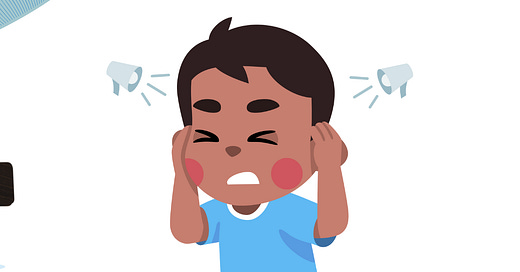Does your child cover their ears, avoid certain places, or get overwhelmed by everyday sounds? If so, they’re not alone. Many neurodivergent kids—especially those with Autism and ADHD—experience intense sound sensitivities that impact their daily lives.
A new study highlights how common these sensory processing differences are, particularly misophonia (intense discomfort from specific sounds) and hyperacusis (increased sensitivity to normal sounds). While the study focused on autistic children, we know these challenges also affect ADHDers and other neurodivergent kids.
🔬 What the Research Found: Sound Sensitivities in Autistic Kids
✔️ 45% of Autistic children have misophonia (strong negative reactions to certain sounds).
✔️ 38% of Autistic children have hyperacusis (general sound sensitivity).
✔️ Girls were slightly more affected than boys:
50% of girls had misophonia, compared to 43% of boys.
43% of girls had hyperacusis, compared to 37% of boys.
✔️ These sensitivities do not lessen with age—they persist throughout childhood.
Why does this matter? Sensory sensitivities can impact mental health, school experiences, and social interactions. Yet, too often, kids are told to "tough it out" or "get used to it"—which isn’t fair or supportive. Instead, we should respect their needs and create environments where they can thrive.
🛑 Neurodivergent-Affirming Support Strategies
1️⃣ Respect Bodily Autonomy: Avoidance Is Okay
✔️ Kids have the right to avoid distressing sounds without judgment.
✔️ They don’t have to "adjust" or "build tolerance"—their comfort comes first.
✔️ If a child expresses discomfort, validate them:
➝ "I see that this sound is too much for you. Let’s find a way to make you more comfortable."
2️⃣ Sensory-Safe Tools for Self-Regulation
✔️ Provide noise-canceling headphones or ear defenders in loud environments.
✔️ Offer a sensory kit (fidgets, sunglasses, chewable jewelry) to help with self-regulation. This can help with sound, too.
✔️ Use white noise machines or apps to block distressing background sounds.
3️⃣ Accommodate Instead of Forcing Tolerance
✔️ Support them by:
Advocating for quieter spaces (e.g., a designated quiet lunch area at school).
Giving them control over their surroundings (e.g., deciding when to wear headphones).
Respecting their avoidance of certain sounds without pressure.
4️⃣ Provide Alternative Communication Tools
✔️ Some kids may struggle to express their discomfort verbally. Try:
A "sensory card" system (e.g., a red card for "this sound is too much").
5️⃣ Educate Others & Advocate for Systemic Change
✔️ Sensory sensitivities are not misbehavior—they are real, valid experiences.
✔️ Schools should offer sensory-friendly accommodations, like flexible seating or quiet rooms.
✔️ Encourage teachers, caregivers, and peers to be understanding and proactive.
6️⃣ Empower Kids with Self-Advocacy Tools
✔️ Teach simple phrases for verbal kids like:
"That sound is too loud for me. Can we turn it down?"
"I need a quiet space right now."
✔️ Support them in advocating for their needs in ways that feel safe and comfortable.
💜 Final Thoughts: Kids Deserve Comfort, Not Toughness
If your child struggles with sound sensitivity, their experience is real and valid. They don’t need to “get used to it” or “push through”—they need understanding and support.
🎧 Call to Action: If your child’s school doesn’t have sensory-friendly policies, consider advocating for quiet spaces, noise accommodations, and flexible learning environments. Small changes can make a big difference!
Download a free fact sheet about this newsletter here
Who am I?
I am a therapist with 30 years of experience. I write four newsletters on Substack, and they are all free.
I run ADHD support groups for women and a therapy practice.
I am also in the process of developing an affirming community where neurodivergent women can connect. Please join, especially if you want to get off Facebook and make this more significant.
Thanks for reading! If you like it, pass it on or share.
Have a good week.
Kristen McClure.






Hey, thanks for this. My 2 1/2 y/o granddaughter is constantly telling me the car radio is "too yowd". Will investigate further...
Thanks for this, it’s such an important topic! I love your caring and affirming attitude.
I’ve just written an article on Sensory Kits, these are so useful, comforting, and empowering and can support children through a range of sensory discomfort. It’s great that you encourage their use.
Thanks for your work in this area.